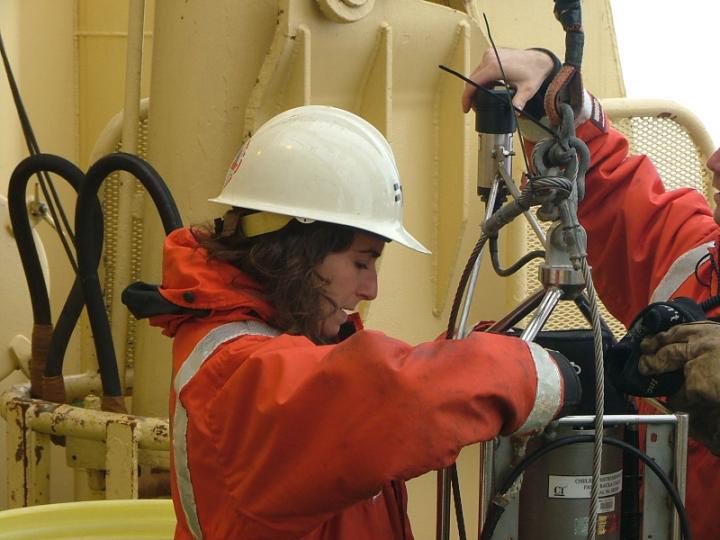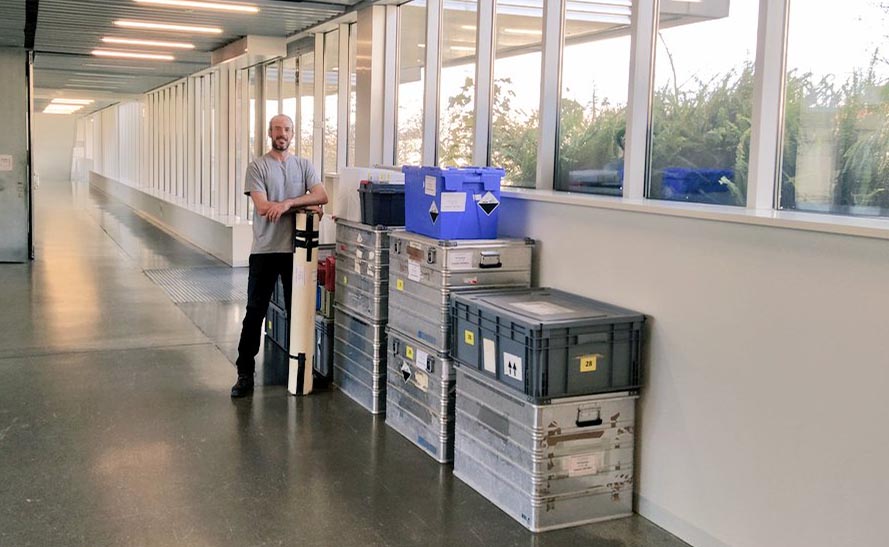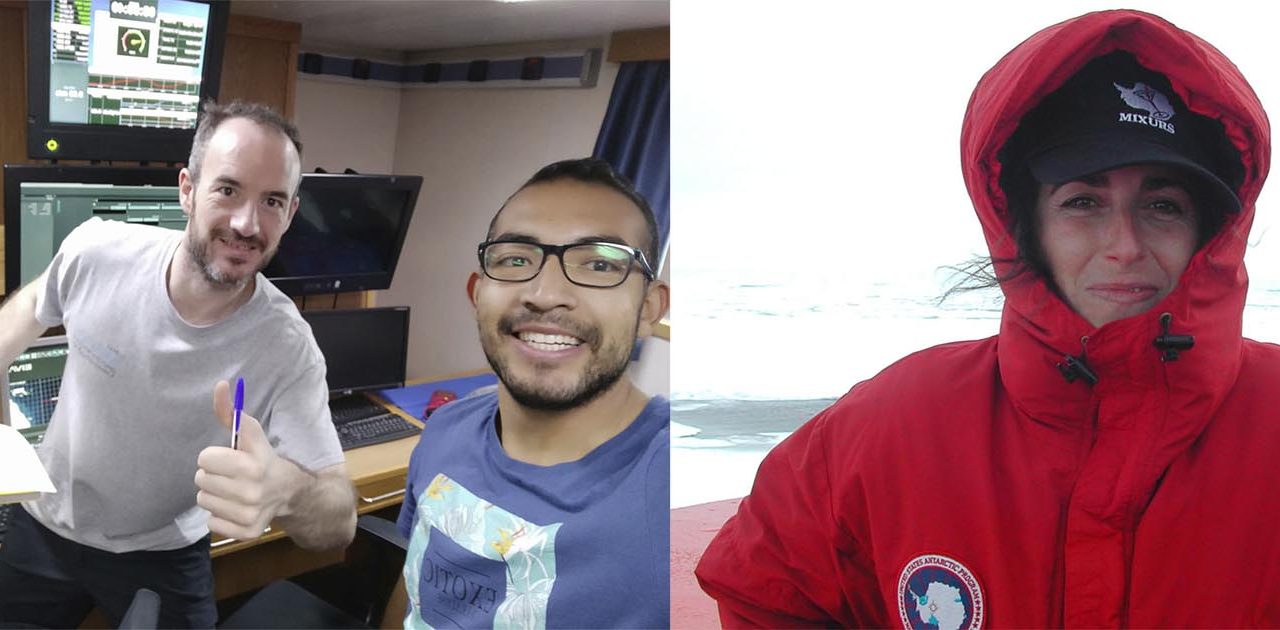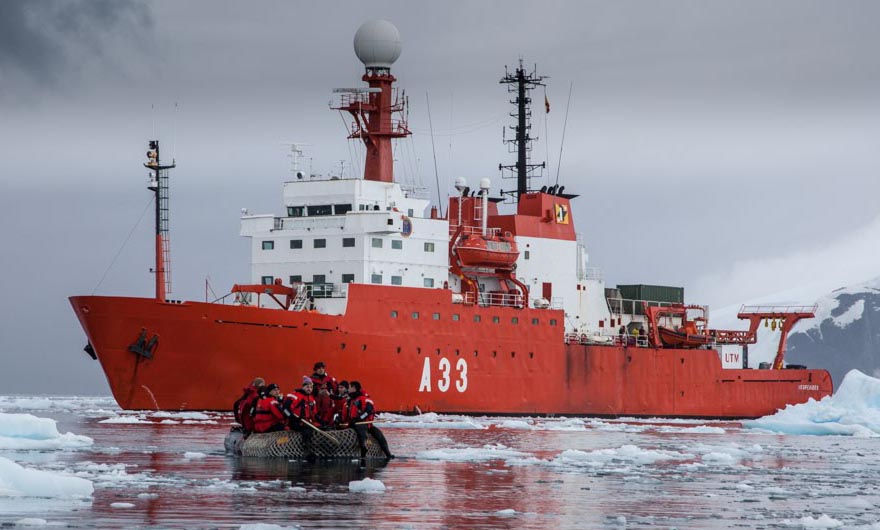Aboard the ORV Hesperides, the expedition departed from the Argentinian port of Ushuaia
The technicians of the Marine Research Center (CIM) Antonio Fuentes Lema and Paulo Alcaraz Rocha, and the professor and researcher of the Department of Ecology and Animal Biology Cristina Sobrino García, are UVigo staff who along with CSIC scientists participate in the Antom-II expedition. The goal of this expedition is to study the impact of pollutants of human origin in Antarctica. Researchers from UVigo, IDEAE-CSIC, ICM-CSIC and IQOG-CSIC departed recently from the Argentinian port of Ushuaia aboard the oceanographic research vessel Hesperides. They will obtain water and air samples in the Southern Ocean to analyze anthropogenic contamination. The results of the study, which was conducted for the first time last year, will help to understand the effects of these chemical pollutants on Antarctic ecosystems.
“The Antom project aims to study the effect of emerging pollutants and anthropogenic semi-volatile organic compounds on the environment and marine organisms, and among the latter, the project focuses on the effect on microscopic organisms, including phytoplankton and bacterioplankton,” said Sobrino. She explains that UVigo researchers are responsible for the study of these compounds of human origin on the abundance, composition and metabolism of phytoplankton. “These results are highly important as phytoplankton, despite their small size, form the basis of the marine food chain and are an active part of the global carbon cycle, capturing atmospheric CO2 and thereby contributing to climate regulation on the planet,” said the UVigo researcher.
The expedition will sail aboard the Hesperides to the Bellinghausen Sea in Antarctica, where research staff will work for a month to find out “what effects organic matter of human origin has on Antarctic microbial communities and assess the ability of bacteria to degrade this pollutant” says project coordinator and IDAEA-CSIC researcher Jordi Dachs. Antom-II continues the study started in December 2020 from the port of Vigo, in which air and water samples were collected in the Atlantic Ocean to determine how chemical pollutants were transported to the Southern Ocean.
A new cruse marked by covid
As in the first Antom expedition, the covid conditioned this campaign that has just begun. “In Antarctic expeditions medical requirements are stricter than in other expeditions due to the uniqueness, danger and isolation ofthe study area. All participants had to pass a strict medical check-up and, of course, submit proff of the complete covid vaccination schedule (in addition to others such as tetanus, typhoid feverand hepatitis) “, lists Sobrino, who is grateful for the role of the UVigo Medical Service that helped them throughout this process. “To all this, we must add the pre-embarkment quarantine time in Ushuaia,” adds the researcher who, “unfortunately due to other professional responsibilities” will collaborate in the campaign from the ground.
For their part, “Antonio and Paulo were in Ushuaia quarantining before embarking in the last hours on the Hesperides. In addition, we only had two seats for UVigo on the ship and after the effort they made in Antom I, they deserved to do their first Antarctic campaign. They are very excited “, explains Cristina Sobrino, who has been to Antarctica on four occasions.
Assessments of the first expedition
One year after the first expedition, the UVigo researcher points out that it is still too early to talk about the definitive results of Antom-I. However, she says that “the preliminary analyses we were able to make of the results of the campaign show that we obtained very good data with which to work and draw relevant conclusions about the interaction between marine phytoplankton and emerging pollutants, but we still have to put the results together with the rest of the participants to be able to obtain a global and more complete overview”.
For Cristina Sobrino, the assessment of the first campaign is, therefore, “very good in terms of results and excellent from the point of view of UVigo’s participation. I know that Antonio and Paulo worked hard and played a very important and proactive role within the group “, confirms the researcher, who considers that working in Antarctica is always a challenge due to the rapidly changing weather conditions. Added to this is that biological activity in this time of the year is very intense, “so it is very likely that each season will be a different world with new technical and scientific situations to face,” she explains.
Source: DUVI





